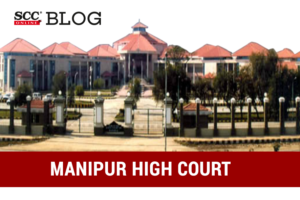Manipur High Court: In a case wherein a Writ of Habeas Corpus was filed challenging the the order of remand passed by the Magistrate under CrPC, a Single Judge Bench of A. Guneshwar Sharma, J.* held that where a person was taken into custody by an order of the Magistrate, then such order could not be challenged by a Writ of Habeas Corpus as the detention could not be termed as illegal.
Background
The petitioner (accused person) was arrested on 31-1-2023 under Sections 34 and 420 of Penal Code, 1860 and by the order of the Judicial Magistrate First Class (“JMFC”), the accused person was remanded into police custody only for three days, that is, till 3-2-2023. On 3-2-2023, the accused person was further remanded till 6-2-2023 and on 6-2-2023 itself, the JMFC treated the remand objection filed under Section 437 of Criminal Procedure Code, 1973 (“CrPC”) as a bail application and thus, called for an objection from the concerned Investigating Officer and thereafter, remanded the accused to judicial custody for 15 days on the ground that the investigation was at initial stage and the document with respect to the land in dispute had been sent to the concerned officer for verification.
Counsel for the petitioner submitted that the authorities had defied the guidelines for arrest as laid down in Arnesh Kumar v. State of Bihar, (2014) 8 SCC 273 and Satendra Kumar Antil v. CBI, (2022) 10 SCC 51 and the provision of Section 41 of CrPC had not been complied with and thus, the accused person was entitled to be released on bail. The respondents raised the question of maintainability of the Writ of Habeas Corpus challenging the order of remand passed by the Magistrate under CrPC. It was submitted by the respondents that the Writ of Habeas Corpus was not maintainable and should be dismissed being devoid of merit.
Analysis, Law, and Decision
The Court relied on State of Maharashtra v. Tasneem Rizwan Siddiquee, (2018) 9 SCC 745, wherein the Supreme Court held that “it was not a case of illegal detention, but the incumbent was in judicial custody by virtue of an order passed by the jurisdictional Magistrate, which was in force, granting police remand during investigation of a criminal case. Therefore, no Writ of Habeas Corpus could be issued”. The Court further relied on Saurabh Kumar v. Jailor, Koneila Jail, (2014) 13 SCC 436, wherein the Supreme Court held that “judicial custody by way of an order passed by a judicial magistrate could not be termed as illegal detention”. Therefore, this Court held that “where a person was taken into custody by an order of the Magistrate, then such order could not be challenged by a Writ of Habeas Corpus as the detention could not be termed as illegal”.
The Court stated that if the submissions of the Senior Counsel for the petitioner were accepted that “there was a violation of the provision of Section 41-A of CrPC and the directions issued by the Supreme Court in Arnesh Kumar and Satendra Kumar had been violated”, then this Court opined that the same submissions could be raised before the remand court in the bail application and if such allegations were true by a necessary corollary, then the accused person would be entitled to bail as held in Satendra Kumar. Therefore, the Court disposed of the present writ petition.
[Abdul Zabar v. State of Manipur, 2023 SCC OnLine Mani 92, decided on 2-3-2023]
Advocates who appeared in this case:
For the Petitioners: Senior Advocate N. Jotendro;
Advocate Jankinath Sharma;
For the Respondents: Public Prosecutor RK. Umakanta.
*Judgment authored by: A. Guneshwar Sharma.

